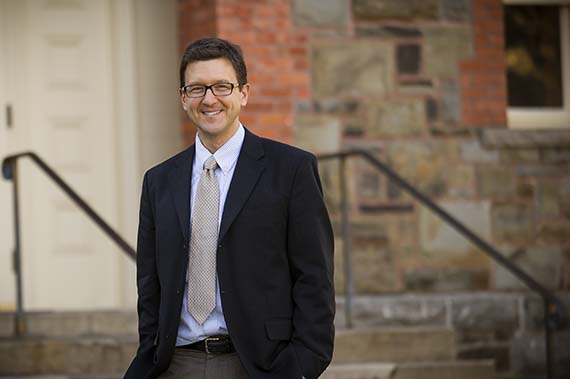
David Dudrick, associate professor of philosophy and director of the new Mellon Sophomore Residential Seminars program, will teach Existentialism in Drake Hall. A week-long academic travel experience to Paris is part of the course.
The Andrew W. Mellon Foundation has awarded a $700,000 grant to °Ä²Ê¿ª½± for use over four years, to support a new program of
The initiative will create a series of courses â to be offered every year for a substantial number of sophomores â in which students will live and study together, meet regularly with the seminar professors and guest speakers in their designated residence hall, and engage in an embedded academic travel experience related to the course. Each spring, all Mellon seminar students will continue the dialog with a one-quarter-credit course with their professor.Students will begin for the initial series, which will be offered in the fall 2013 semester and located in Drake Hall. Beginning in fall 2014, there will be at least four seminars offered every fall for 16â18 students each, and new courses will be added to the rotation each year. More information can be found .
The first course options are: Existentialism, with (philosophy), director of the program; Coffee and Cigarettes, with (history); and Jerusalem: City of Gods, with (religion, Jewish studies).
The faculty members also were asked to apply.
âI like the idea of students talking about their courses and about the ideas they encounter in their courses over lunch or in their dorm rooms late at night,â said Cushing, who recalled going to a large university in the U.S. and missing the sense of âintimate intellectual communityâ she had experienced in her small high school in Canada.
âIt seemed to me that if students are involved in an intensive learning situation, where theyâre living with each other and studying the same things, really interesting conversations are bound to ensue. I like the idea of promoting that kind of learning environment.â
Cushingâs course is an introduction to Judaism, Christianity, and Islam that uses Jerusalem, a holy city to all three, as a central site. A cookbook will be among the texts. âCooking and eating together are not just ways of getting to know the cultures we are studying; they are incredibly important for creating social, religious, and personal bonds,â she said. Her class will travel to Jerusalem, while Dudrickâs and Nemesâs students will further their academic pursuits in Paris and Costa Rica respectively.

Rob Nemesâs history course, Coffee and Cigarettes, includes a trip to the coffee belt country of Costa Rica.
âIn Coffee and Cigarettes we spend a lot of time discussing all aspects of these everyday goods, but their production remains far removed from the studentsâ (and my own) experience,â said Nemes, who has taught the course before. âA trip to Costa Rica (or someplace else in the âcoffee beltâ) in January will help us unravel this mystery and to appreciate the expertise, labor, capital, and geography that produce the coffee we drink.â
Though °Ä²Ê¿ª½± has offered occasional courses with a living-learning dimension, the will impact up to 70 sophomores a year with academic interests from across the curriculum. The weeklong travel experience in January, to be included at no additional cost to the students, is entirely new to the residential model.
âThe residential seminars will allow us to explore new ways that students can live and learn together, an obvious priority for our residential community at a time when some are questioning the need for college campuses,â said President Jeff Herbst. âWhile we will contribute considerable °Ä²Ê¿ª½± resources to the project, the Mellon Foundationâs assistance is critical and greatly appreciated.â
The residential seminars idea ties to recent strategic planning aimed at enriching intellectual community at °Ä²Ê¿ª½±, and is one result of the collaboration thus far between Douglas Hicks, dean of the faculty, and Suzy Nelson, dean of the college. This is the first academic year at °Ä²Ê¿ª½± for both Hicks and Nelson.
According to Hicks, the add to the rich menu of opportunities that °Ä²Ê¿ª½± students have for learning within and beyond the classroom. âThis program will build on the best of a residential liberal arts education,â he said. âIt will deepen faculty-student mentoring and student-student social and intellectual engagement.â
Nelson believes the program will resonate with sophomores in particular. âSophomore year is a critical time for students to solidify their college identities,â she said. âThis is when they develop the social and academic networks that will support them throughout their remaining college years and beyond.â
Dudrick, a philosopher, believes the seminar format will be especially effective for confronting his disciplineâs basic questions, from Plato to the present: Who am I? How should I live? For what may I hope? âWe engage philosophers of the past not just in order to understand them but to understand ourselves and, ultimately, to seek the truth,â he said. âThe living-learning community will be something like a âphilosophy lab.â In conversation with one another, students will put their ideas to the test.â
But Dudrick also sees the Mellon Sophomore Residential Seminar program as meeting a broader need at °Ä²Ê¿ª½±. âI think °Ä²Ê¿ª½± students yearn for a way to integrate their social and intellectual lives within a community,â he said, âand the seminars will provide a way to do just that.â
